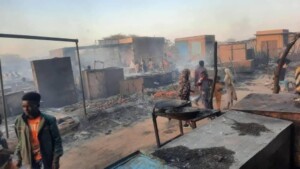Sudan Shield Forces head vows ‘to enter Khartoum within 48 hours’

Sudan Shield Forces commander Abu Agla Keikel (Supplied)
The commander of the Sudan Shield Forces, allied to the Sudanese Armed Forces (SAF) in the war against the paramilitary Rapid Support Forces (RSF), has vowed to enter the capital city of Khartoum, which is currently under RSF control, ‘within 48 hours’, amid ongoing advances and successes by the SAF and allied forces in the area.
“Just as we fulfilled the promise we made to enter Wad Madani within two days, we will fulfil this promise as well,” Abu Agla Keikel said in a speech monitored by Radio Dabanga.
The Sudan Shield Forces commander was addressing a crowd of officers and soldiers at El Ghar camp in Butana, during a visit by the assistant commander-in-chief of the army, Lt Gen Yasir El Atta.
The SAF and their allies were able to take control of Wad Madani on Saturday. As reported by Dabanga – Radio TV Online earlier today, nine people were killed in an attack on Abu Gouta, El Gezira, this morning, marking the latest in a series of violent incidents targeting residents of the region.
Reports indicate that these attacks have included killings, torture, arbitrary arrests, and human rights abuses, which has prompted a chorus of condemnation from within Sudan as well as the international community.
In October, Keikel who was previously the commander of the RSF in El Gezira state, announced his defection from the RSF to join the army. His defection led to widespread violations in the eastern areas El Gezira, where he hails from.
Initially called the El Butana Shield Forces, the later renamed Sudan Shield Forces were established under the leadership of Kikil, during the transitional period, within the framework of a number of military bodies. The name of the forces was At the time, political activists accused the army of forming these bodies to undermine the transitional period. After the outbreak of the war, Keikel announced his allegiance to the RSF, and played a major role in East Nile in Khartoum North/Bahri and El Gezira.
Renewed fighting in Khartoum
Fighting resumed on Wednesday the El Mogran area in central Khartoum. The army also launched artillery shelling from the Wadi Seidna military area to the areas controlled by the RSF in Khartoum North/Bahri.
The Shambat El Ardi Resistance Committees in southwest Khartoum North said in a statement seen by Radio Dabanga that the SAF have taken control of strategic and dominant points in Shambat, meeting little resistance.
The SAF have reportedly taken control of El Rawad complex in southern Khartoum.
They also advanced towards the areas north and south of the Jeili refinery, in addition to advancing on the El Faatiha and Ombada axes.
Regarding the accusations that his forces committed crimes against seasonal workers (kanabi) in El Gezira, Abu Agla Keikel denied that his forces committed any violations or crimes, adding: “Our forces include 200 kanabi*, including 10 officers.”
He accused unnamed parties of tarnishing the reputation of his forces, adding: “Our forces are national and do not belong to any tribe, party or group,” announcing his readiness to send soldiers to Khartoum and Darfur.
Violations
As reported yesterday by Radio Dabanga, graphic video footage was widely shared on social media allegedly showing SAF troops and militia forces loyal to Abu Agla Keikel torturing a doctor with special needs in Wad Madani.
US envoy to Sudan Tom Perillo expressed concern over reports of “retributions against individuals” from Wad Madani, in a post on X (formerly Twitter) yesterday.
His appeal was echoed today by United Nations Resident and Humanitarian Coordinator in Sudan, Clementine Nkweta-Salami.
In a statement today, the Sudanese Journalists Syndicate called for transparent trials for those responsible and urged an end to the circulation of graphic videos, cautioning that such material risks fuelling hate speech and exacerbating social divisions. It condemned extrajudicial killings and degrading treatment of civilians, stating that such actions violate human and legal principles.
*Keikel, who founded the Sudan Shield Forces in 2022, was once a critic of the civilian-led government chaired by PM Abdalla Hamdok, and the 2020 Juba Peace Agreement. After having defected to the RSF, his return to the army signals a strategic reversal as the violent conflict between the two military factions drags on.
Reiterating their ‘open-door policy’, the SAF urged other RSF members to defect and promised amnesty to those who report to the nearest military command. Keikil’s defection, military experts suggest, could embolden others to follow suit, further weakening the RSF’s ranks.
Since the army took control of Wad Madani, El Gezira has witnessed widespread violations including killings and burning, while human rights organizations said that the crimes amount to war crimes and crimes against humanity. A number of parties said that the crimes could fall within the framework of ethnic cleansing and genocide.
The Central Committee of the El Kanabi Conference and the General Coordination of Displaced Persons and Refugees accuse the Sudan Shield Forces led by Keikel of launching the attacks on kanabi.
The El Kanabi Conference counted more than 35 dead, dozens wounded and a large number of houses burned since last Saturday in a number of seasonal workers and said that it documented acts of rape, sexual violence, and kidnapping during the attacks.
In a statement issued yesterday, the SAFdescribed the crimes committed as “individual transgressions” and promised to hold those involved accountable.
In contrast, the Darfur Bar Association criticised the SAF statement’s focus on denying responsibility for committing crimes and attributing them to individuals. It said the statement did not take into account the duty to console the families of the victims, and was limited to avoiding criminal responsibility.
* Kanabi (Arabic plural of ‘camp’) is a name given to seasonal labourers (camp workers) in Sudan, in particular in central Sudan. Many of them moved from western parts of the country, including Darfur, in the last century in search of work in the El Gezira Agricultural Scheme, set up by the British. The workers settled on the outskirts of villages and near irrigation channels and water banks. Others went to work on plantations in eastern Sudan.
As the successive El Gezira state governments considered the kanabi temporary workers, they did not provide many services. Their lives can be characterised by poverty and isolation, due to government policies and the discrimination they face based on ethnicity and culture from the surrounding population. According to figures presented by Jaafar Mohamedein, secretary general of the Kanabi Congress, in 2018, nearly 2,500,000 kanabi were living in 2,095 ‘camps’ in El Gezira, making up 39 per cent of the total population of the state. In October 2020, the Kanabi Congress called for transforming their settlements in El Gezira and eastern Sudan into model towns and villages on state-owned lands.











 and then
and then